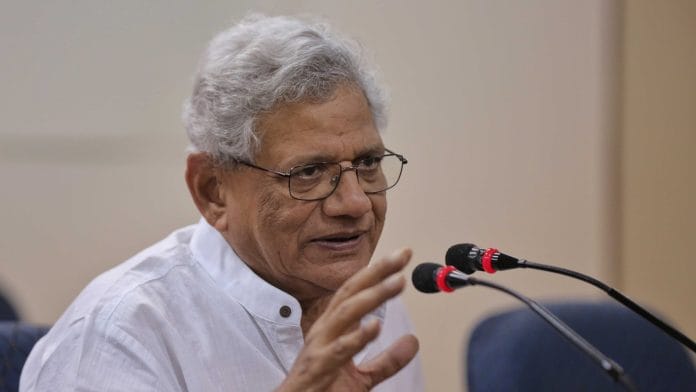Sitaram Yechury was my friend, philosopher, and guide in the truest sense.
I first met Sitaram Yechury in 1980 at an SFI conference in Mumbai. From the moment I was introduced to him, I found him to be a perfect gentleman, admirable, with a smile that could connect with anyone, regardless of age, caste, creed, language, or gender.
He was not only admired by CPI(M) members and colleagues but also by those outside our party, including media personnel, young journalists, students, technocrats, scientists, and cultural activists. Having joined the party from the student movement, he always had a special connection with students and youth, both inside and outside the party.
Yechury’s command over languages was impressive; he could speak at least 6-7 languages, including Bengali. His education, cultural taste, and vast knowledge were remarkable. He was not only an expert in economics but also in politics, political science, and Marxism-Leninism. He was ideologically sound, politically committed, socially acceptable, and culturally refined.
Also read: Marxism is a creative science—what CPIM’s Sitaram Yechury said on communism, coalition politics
Acceptance and personal rapport
Yechury maintained connections with other political parties in India, which was crucial, especially when we were fighting to protect and preserve our pluralism, multiculturalism, and broader unity to prevent the country from falling into the trap of fascist forces. At the same time, he worked tirelessly to protect our secular democratic republic and federal structure.
Beyond the CPI(M), he found acceptance among other left, democratic, and secular political parties. With his experience and political acumen, he emerged as a true successor to Jyoti Basu and Harkishan Singh Surjeet.
On a personal level, Yechury maintained a friendly atmosphere with all his colleagues and comrades. He engaged in discussions on theoretical and ideological matters. I had a personal rapport with him from my involvement in the student and youth movements, particularly when I worked at the All India Centre where he was in charge of student and youth organisations. He was a true disciple of M Basavapunnaiah, one of the founding members of CPI(M).
Here’s a personal anecdote I find quite interesting. In 1989, when VP Singh led a revolt and the Jana Morcha was formed, a significant meeting of opposition leaders was held at Netaji Indoor Stadium in Bengal.
At that time, I was a youth leader in Calcutta, volunteering alongside Bahuguna and others who had come to support the Jana Morcha leaders. While I was working as a volunteer, Sitaram Yechury was on the dais. Speaking in Hindi, he remarked to me, “Tere liye mere ko gaali sunna padta hai” (For you, I have to listen to abuse).
Coincidentally, my professor from Jadavpur University, Deep Prasad Chattopadhyay—a Congressman who had served in Indira Gandhi’s cabinet—was complaining to Yechury about my failure to complete my PhD despite his insistence. At the same time, Yechury’s economics professor from JNU, Prof Bhattacharya, was listening in.
Chattopadhyay expressed his frustration, saying, “The party system is such that he became a whole timer and didn’t complete his PhD. Otherwise, he could have done well in academia.”
Hearing this, Prof Bhattacharya said, “Who are you complaining to? It’s the same with Sitaram. I also insisted he complete his PhD, but he never did.”
Yechury then turned to me and remarked, “Look, my professor is saying that ‘Sitaram belongs to the same flock.’”
Also read: Pragmatist who could make or break coalitions: The many facets of CPI(M) stalwart Sitaram Yechury
The unofficial ambassador of Bengal
Sitaram Yechury was an undeclared ambassador of Bengal in Delhi, representing both the party and the government. He handled matters pending with the central government, including projects and issues, engaging with bureaucrats, officials, government departments, ministries, and even embassies. Whenever the party, the government in Bengal, or people elsewhere were in trouble, he served as an extended ambassador. He truly was an ambassador at large, which is why he represented Bengal twice in the Rajya Sabha.
Within the party, he encouraged me to become a joint spokesperson with him. For a decade, we sat together at media press conferences in Parliament.
Yechury had an excellent sense of humor and an ability to weave mythological characters into his speeches. He used these skills particularly in his fight against communalism, drawing examples from Indian history, politics, and mythology to promote secular practices and pluralism. He wasn’t just preaching a secular life but also living it.
Whenever he campaigned for me during elections, he would use a famous dialogue from Mughal-e-Azam with a slight twist: “Yeh sarkar tumhein jeene nahin degi aur Salim tumhein marne nahin dega” (This government won’t let you live, and Salim won’t let you die).
His demise leaves a huge void in the party. However, as communists and Marxists, we believe that nobody lasts forever—that’s the scientific approach.
But Yechury was a product of struggle and organisational work, and our continuous political and organisational tasks, movements, and successes will help fill the gap he leaves behind.
He was certainly disappointed with the left’s electoral decline, but the communists are not pessimists. Whenever Yechury visited Bengal in the last 10 years, he would often say, “The left in India will not be able to revive if the resurgence of CPI(M) does not happen in Bengal. The task of the Bengal left and the communists is to have a resurgent communist movement in Bengal for the sake of the revival of the left movement in the country.” This was his oft-repeated motivational dialogue for the communists in Bengal and for the rest of the country.
We will work to prove that his faith in Bengal was not misplaced. The future will show this.
Md Salim is CPI(M) West Bengal state secretary and former Rajya Sabha and Lok Sabha MP who also served as youth affairs and minority development minister. He tweets @salimdotcomrade. Views are personal.
(Edited by Prashant)






